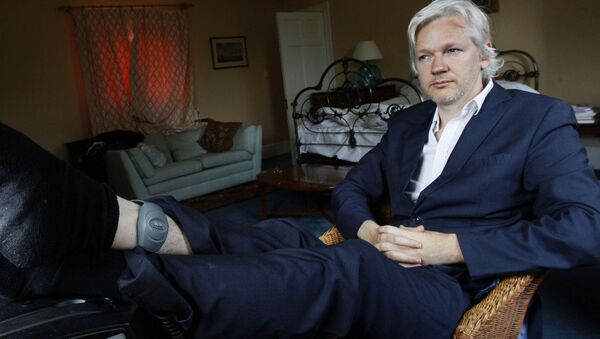According to Alex Finley (the fake name of the real former spy), it could have been the Russians who fed him a fake story to discredit him.
The notion is so absurd one might wonder whether Finley, who has written for comedy websites and even authored a book of satire, was just trying to be funny. But since this is the era of Russiagate, nothing is outside the realm of possibility when it comes to Russian President Vladimir Putin and his sophisticated disinformation operations — at least if you read Politico or other mainstream media.
— Matt Taibbi (@mtaibbi) November 29, 2018
Sputnik News has already all but debunked the Guardian article, which posited that former Trump campaign chairman Paul Manafort secretly met with WikiLeaks editor Julian Assange — a charge denied by both parties. The Guardian has also toned down the original article by changing the phrasing in key sections to transform their assertions into mere claims made by their nebulous sources.
— WikiLeaks (@wikileaks) November 28, 2018
Politico's suggestion that Russians may have sought to discredit the article's author, former Moscow-based reporter Luke Harding, is implausible at best. It is difficult to imagine that any intelligence agency, Russia's included, would go to such lengths to smear a journalist who already has such a poor reputation. It is indeed a wonder that a former American intelligence agent could believe it.
Harding, after all, is a documented plagiarist. He is also the author of a book on the alleged collusion between Trump and Russia that fails to offer a shred of tangible evidence for its claims, and Harding himself has abruptly ended interviews with reporters when pressed for proof of the assertions he makes between its covers.
— Aaron Maté (@aaronjmate) November 29, 2018
The only evidence cited in Harding's report for the Guardian, aside from "claims" from anonymous officials, is a document from an Ecuadorian intelligence agency that was recently disbanded.
In Politico, the former CIA agent writes that if the Ecuadorian intelligence document is fake, and the sources' testimonies are false, then "any mention of Harding going forward would include the caveat, ‘according to a reporter who was once duped.'"
— Glenn Greenwald (@ggreenwald) November 29, 2018
Finley says that Harding's story on the elusive Manafort-Assange meeting, which isn't corroborated by embassy logs, "could be the proverbial smoking gun" in the hunt for collusion between members of the Trump campaign and officials of the Russian Federation.
— Glenn Greenwald (@ggreenwald) November 28, 2018
This would be good news for the Resistance crowd and Russiagate pushers — if only it weren't so hard to believe. Journalists who have been covering Russiagate — even ones with some openness towards the underlying claim of collusion — are largely skeptical. There is even a list of all the influential Russiagate reporters that are treating the Harding piece with significant caution.
Glenn Greenwald, who previously worked at the Guardian and tweeted that he hopes "the story turns out true," pointed out "blatant fabrications" contained in the Politico story that blamed Russia. The article accuses Greenwald of having worked with WikiLeaks "to distribute the documents stolen by former NSA contractor Edward Snowden," which is, in fact, a historical falsehood.
— Alex Rubinstein (@RealAlexRubi) November 29, 2018
While a who's-who of the reporters covering the Russia story for the past two years are skeptical, Politico only cites skepticism from enemy number one of the US and UK mainstream media: Sputnik and RT.
Sputnik News "called the story in question and bolstered the skepticism," Finley says, failing to note that raising tough questions is one of the primary hallmarks of quality journalism.
Instead, Finley focuses on Sputnik News' inclusion of embedded tweets from journalists and media insiders about the Guardian story, which included, in the former CIA officer's words: "Eva Golinger, a former adviser to the government of the late Venezuelan leader Hugo Chávez and a current contributor to RT's Spanish-language network; Ivor Crotty, another RT contributor; and WikiLeaks."
"Speculating that Harding has been somehow 'penetrated' is as laughable as his plagiarism (un-mentioned by the former CIA agent) was to Muscovites, never mind the collapse of his claims at Aaron Maté's capable hands," Crotty, deputy director, creative and innovation at RT and a Muscovite since 2006 (and who once had dinner with Harding), told Sputnik News via Twitter direct message.
"Russiagate reporting continues its descent into farce," Crotty said.


